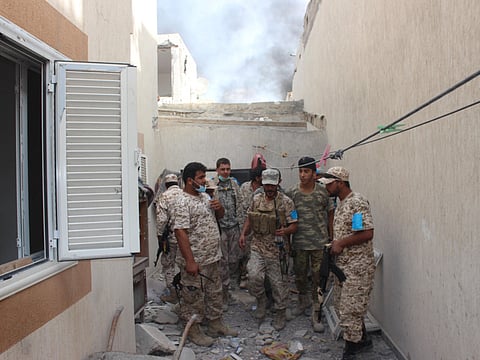Libya’s divisions bring country to the brink of anarchy
Besides the presence of domestic political players, militias and armed groups, the attitudes of international players aren’t helping unite Libyans

Since the removal of former dictator, Muammar Gaddafi, Libya has been riven by conflict and internal divisions. Today, three different governments operate within Libyan territory, each of them claim to be the legitimate authority. In the west of the country, the Khalifa Al Gawil-led National Salvation Government, formed by the National Congress, competes with the Fayez Sarraj-led Government of National Accord (GNA), which was born of the December 2015 Sukhairat Agreement. A third, distinct government, headed by Abdullah Al Thani is based in the east of the country and was born out of the House of Representatives, which operates from Tobruk.
According to the Sukhairat Agreement, the GNA is considered legitimate only when it wins the endorsement of the “Tobruk Parliament”. Thus far, that has not happened and the GNA is hence considered by many inside Libya and out as illegitimate. Furthermore, since it was formed, the GNA was reduced to watching on the sidelines, powerless to put an end to the state of anarchy and pervasive violence at least in the western part of the country where it operates. The two competing governments led by Al Thani and Gawil continue to spar and attempt to impose their authority on the ground. The idea of a nationwide reconciliation, not to mention questions of economic improvements for Libyan nationals, now appears a distant dream.
In order to shore up both its national and international credibility, the GNA launched a large-scale operation to nudge Daesh (the self-proclaimed Islamic State of Iraq and the Levant) out of the coastal city of Sirte this May. Since then, Daesh was pushed into a few isolated districts within the city of Sirte. By August, the US had weighed in as well, launching air strikes from airfields located in Italy, targeting Daesh positions in Sirte. This was perceived as if the US was lending support to the GNA, favouring it over its political rivals. Yet, the October 18 rebellion of Libya’s Presidential Guard, a body normally tasked with protecting the presidential sites, against the GNA landed a fatal blow to Sarraj’s efforts to consolidate the power of his government in Tripoli and the west of the country.
The presidential guard seized the headquarters on the GNA with the ulterior motive of demanding the payment of long overdue salaries of its members. The roots of the crisis extend to an earlier period, however, when the GNA took over the headquarters of the Khalifa Al Gawil-led National Salvation Government, a point at which the chief of the Guard, Ali Ramali, refused to obey the orders issued by the GNA. Ramali was dismissed from his position, as a result.
Before his dismissal, however, Ramali was able to consolidate his hold on most of the Guard and the mechanisms by which its members were paid. This resulted in a situation where the pro-Ramali guards were able to continue drawing salaries, while those who opted to support the GNA were left in dire straits. The Al Gawil government seized the opportunity to undermine the power of the GNA, calling upon all of the military units in the country to band together under its leadership to “restore stability to Libya”. Shortly thereafter, the Al Gawil government announced that it had won control of the state-owned Guest House Complex, where it hosted a series of meetings with the rump of the National Congress.
When these events were taking place in the west, the GNA was reeling from another big blow in the east resulting from the loss of the country’s major oil fields in the “Oil Crescent” running along the northeastern part of the country to the government of Abdullah Al Thani of the east. To add insult to injury, the Al Gawil government in the west called for the formation of a national unity government with the Al Thani government in the east, thereby ignoring the existence of the GNA. The proposal is being currently considered by the Tobruk parliament.
Beside the presence of a vast number of domestic political players, militias and armed groups — all competing for power and seeking a lost legitimacy — the attitudes of the regional and international players are not helping unite Libyans. The US and its European allies seem to be solely interested in defeating Daesh in Libya. These countries cannot afford to see Libya transformed into a safe haven for fighters associated with the group in the event of its defeat in Syria and Iraq. Yet, they do not seem much concerned about the fact that a final victory against Daesh cannot be attained amidst national divisions and anarchy.
Dr Marwan Kabalan is a Syrian academic and writer.
Sign up for the Daily Briefing
Get the latest news and updates straight to your inbox



